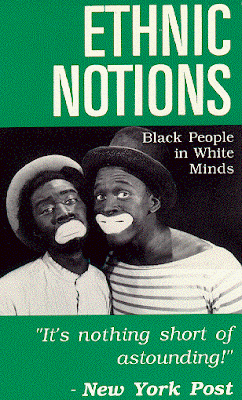
Ethnic Notions is Marlon Riggs' Emmy-winning documentary that takes viewers on a disturbing voyage through American history, tracing for the first time the deep-rooted stereotypes which have fueled anti-black prejudice. Through these images we can begin to understand the evolution of racial consciousness in America.

Marlon Riggs
Loyal Toms, carefree Sambos, faithful Mammies, grinning Coons, savage Brutes, and wide-eyed Pickaninnies roll across the screen in cartoons, feature films, popular songs, minstrel shows, advertisements, folklore, household artifacts, even children's rhymes. These dehumanizing caricatures permeated popular culture from the 1820s to the Civil Rights period and implanted themselves deep in the American psyche.
Narration by Esther Rolle and commentary by respected scholars shed light on the origins and devastating consequences of this 150 yearlong parade of bigotry. Ethnic Notions situates each stereotype historically in white society's shifting needs to justify racist oppression from slavery to the present day. The insidious images exacted a devastating toll on black Americans and continue to undermine race relations.

Ethnic Notions has quickly become a mainstay of university, high school, and public library collections. It is a basic audio visual text for American History, Sociology, Black Studies, Anthropology, Social Psychology, Media Studies, and any training program concerned with stereotyping and cross-cultural understanding.
Approaching a complex and delicate subject with great sensitivity, Ethnic Notions equips viewers to view media and other cultural representations with a more critical eye. It's a direct challenge to those who say, "It was just a joke."
Ethnic Notions
Ethnic Notions Transcript
VOICE-OVER: A is for Aunty, de odes 'er all, she rocks all us chil'ren t' sleep in her shawl.
D is for Daniel, who tends to de do', he took care of massa, way back 'fo de woh.
F is for Felix, who won't do no wuk, he's lazy and shif'less and ready to shirk.
Z is for Zonia, chunky and small, but 'ere comes de Missus so I guess dis am all.
VIDEO/SYNC: (Cartoon) SCRUB ME MAMA WITH THE BOOGIE WOOGIE BEAT
"Listen, Mammy, that ain't no way to wash clothes. What you all need is rhythm!"
"Wh- wh- what do you all mean, rhythm?"
"Ha ha ha ha. I'll show you what I mean!" (music)
NARRATOR: The mammy … the pickaninny … the coon … the sambo … the uncle: Well into the middle of the twentieth century , these were some of the most popular depictions of black Americans
By 1941, when this cartoon was made, images like these permeated American culture.
These were the images that decorated our homes, that served and amused and made us laugh.
Taken for granted, they worked their way into the mainstream of American life. Of ethnic caricatures in America, these have been the most enduring.
Today there's little doubt that they shaped the most gut-level feelings about race.
LEVINE: When you see hundreds of them, uh in all parts of the country persisting over a very long period of time, they have to have meaning. They obviously appeal to people. They appeal to the creator, but the appeal also to the consumers, those who read the car - look at the cartoons, or read the novels, or buy the artifacts.
CHRISTIAN: It is not just that it's in the figurines, and the uhn coffee pots and so on, it is that we are seen that way, perceived that way, even in terms of public policy. And that our lives are lived under that shadow, and sometimes we then, even become to believe it ourselves.
LEVINE: Blacks don't really look like that. So why is it so appealing to people to think they look like that, and pretend they look like that, and to like to look at icons that look like that. You look at them often enough and black people begin to look like that, even though they don't. Um, so that they've had a great impact in our society.
They therefore tell us both about the inner desires of the people who create and consume them, and also they tell us about some of the forces that shape reality, for large portions of our population.
VIDEO/SYNC: UNCLE TOM'S CABANA
Well now chil'ren, ol' Uncle Tom's gon' tell you the real true story about Uncle Tom's Cabin
NARRATOR: Contained in these cultural images is the history of our national conscience striving to reconcile the paradox of racism in a nation founded on human equality - a conscience coping with this profound contradiction … through caricature.
No comments:
Post a Comment